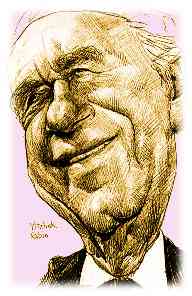 |
 |
Jonathan Tobin
What price
free-speech?
The legacy of the Rabin assassination
IT DIDN'T TAKE LONG for the rumbling to start.
As soon as Israeli Prime
Minister Benjamin Netanyahu affixed his signature to the Wye River
Memorandum, the outrage among his erstwhile allies in Israel's right wing started to
bubble. And as soon as the angry demonstrators started to hurl epithets like
"traitor" at the man that most of them had voted for in 1996, the counter-
attack against the protesters began to roll. Everyone from Israel's loose-
lipped President Ezer Weizman to the head of the Anti-Defamation League,
admonished the Jewish world: Angry words helped kill Yitzhak Rabin, they
said.
Don't let history repeat itself.
Elsewhere, the brutal murder of a gay man by bigots and the cold-blooded
assassination of Jewish doctor who performed abortions (presumably by a
"right to life" fanatic) outside of Buffalo, New York, has also put the question of
hate speech back on the front burner.
CONNECTING SPEECH TO VIOLENCE
The ADL, in particular, has worked hard to pass hate crime legislation
around
the country which would create a system to statistically monitor crimes that
can be linked to bias as well as to treat the perpetrators more harshly. I'm
all in favor of keeping official tabs on prejudice as it is manifested in
criminal behavior. Where I part company with the conventional wisdom of the
day which favors hate crime laws, is the notion that it is worse to be
beaten,
robbed or murdered if it is a result of hate as opposed to other criminal
motivations.
The focus of the criminal justice system should be the crime,
not the ideas of the criminal. Murder is murder and should be punished severely
(including the use of capital punishment where appropriate) whether the
killer is a bigot or not. By saying hate crimes are worse than other criminal
behavior, we are setting a troubling precedent which can only serve to
furtherdivide society.
But the question with the hate crimes committed in Wyoming and Buffalo -- as
with the murder of Rabin and threats against Netanyahu -- is how does the
creation of an "atmosphere" of anger on a specific issue lead directly to
violence.
Those who loosely claimed that Oslo wasn't merely wrong and a dangerous risk
but a betrayal which could legally be prevented through violence may not
have envisioned Yigal Amir pulling the trigger. Nor do most abortion foes support
violence against abortion providers. But fanatics are always prepared to
draw extreme conclusions. That's the problem with moral absolutes. Once you buy
into an apocalyptic scenario, the road to madness is open.
The rabbi who pronounces Rabin or Netanyahu a moser or rodeph -- types of
criminals who are liable to execution under Jewish law -- or the priest who
pronounces a doctor a murderer -- needs to be reminded of Justice Oliver
Wendell Holmes' famous dictum in the 1919 court case Schenk v. United
States:
"The most stringent protection of free speech would not protect a man in
falsely shouting fire in a theater and causing a panic..."
FREE SPEECH FOR ME BUT NOT FOR THEE
But those who campaign about hate speech also have to be careful. Free
speech
is one of our most precious freedoms and sacrificing freedom in the name of
order or safety is the business of tyrannies not democracies. Moreover, they
need to remember the less famous second part of that Holmes quote: "The
question in every case is whether the words used are used in such
circumstances and are of such a nature as to create a clear and present
danger..."
In other words, if you are going to accuse someone of inciting violence, you
had better be able to prove the connection between words and bullets.
Otherwise, all you are doing is suppressing opinions in the grand tradition
of
"free speech for me, but not for thee," as writer Nat Hentoff memorably put
it. Listen to the rhetoric from the Jewish left about anyone who questioned
Rabin's policies and you know exactly what Hentoff was talking about.
RABIN MURDER PLOTS --- LEFT AND RIGHT
The murder of Rabin has also generated its own genre of conspiracy theories.
Three recent books about Rabin and the murder run the gamut.
At one extreme is Murder In The Name of God: The Plot To Kill Yitzhak
Rabin, by Michael Karpin and Ina Friedman (Metropolitan Books, 1998). Karpin and
Friedman give a lot of interesting inside information about Yigal Amir and
his pals on the extreme right and the incendiary talk about permissible murder
that was rife among extremists after the signing of Oslo in 1993. But they
are too quick to accept stock answers about the wild card in the murder: Avishai
Raviv who was a government agent/agent provocateur who egged on Amir to
murder and helping to organize the most extreme anti-Rabin excesses. Karpin and
Friedman have a political agenda that colors virtually every page:
demonizing Netanyahu and all who opposed Oslo.
They make virtually no distinction between political opposition to the Labor government and murderers. Their goal -- like that of the extreme right is -- kulturkampf -- delegitimization of political
foes.
At the other end of the spectrum is a far worse book called Who Murdered
Yitzhak Rabin by Barry Chamish (Feral House, 1998) Its publisher is the
source of books which, among others, accuse the Federal government of the
Oklahoma City bombing. Enough said. The book and its author are off the deep
end.
Recommended reading for those who like to learn more about Rabin is Dan
Kurzman's "Soldier of Peace: The life of Yitzhak Rabin (Harper Collins,
1998) .
This is not a critical or historically authoritative account of Rabin's
life.
It is openly admiring and has the fault of looking at historical
controversies
only from Rabin's point of view (such as his involvement in the tragic
"Altalena" incident in which Rabin ordered his soldiers to fire on fellow
Jews). But it is also highly readable and informative, particularly when it
comes to Rabin's prickly personality. Kurzman tells us that Rabin never
tried
to win over his critics or to demonstrate sensitivity for their concerns. He
didn't make a distinction between the majority and the extremists.
As Kurzman writes, "Rabin's habit of dismissing someone's opposing view with
a
sharp jerk of his hand was reflected verbally in his sarcastic, sometimes
brutal remarks."
Consensus was not his goal.
BIBI'S CHOICE: CONSENSUS NOT DIVISION
And that's what brings us back to Benjamin Netanyahu. As he attempts to lead
Israel to the culmination of an Oslo treaty that he never supported, he has
come to the realization that he must unite the entire country behind his
policies. Unlike Rabin, who felt he could govern without winning over
Israelis that didn't vote for his coalition, Netanyahu knows he cannot dismiss the
other half of Israel.
This past weekend I listened to Dore Gold, Israel's U.N. Ambassador and Bibi
advisor explain the Wye agreement to a skeptical audience at the Zionist
Organization of America dinner in New York City. Gold told them that in
spite of the flaws of Oslo, Israel's government must try to bridge the divide
between the left and the right -- what he called -- the "patriots of peace
and the patriots of security." He indicated that the Netanyahu strategy was "to
build a national consensus" on those issues on which the overwhelming
majority of Israelis agreed like Jerusalem.
That ruled out sticking to the Likud
platform in spite of the fact that Netanyahu and Gold both seem to regard
Oslo as a path to disaster.
As much as hate speech must be condemned, leaders also have a responsibility
to try to unite the nation. And as dissatisfying as that may be to partisans
who agreed with Netanyahu's criticisms of Oslo or those who think Rabin's
critics should be silenced, finding that middle ground may be the bottom
line for domestic peace in
 That this episode occurred only days before the third anniversary of the
murder of Yitzhak Rabin (z'l) made the irony complete. Accused unfairly
three years ago of leading a campaign of "incitement" which led to murder (as
Rabin's bitter widow alleges to this day), Netanyahu is now the putative
victim of hate speech from his own camp.
That this episode occurred only days before the third anniversary of the
murder of Yitzhak Rabin (z'l) made the irony complete. Accused unfairly
three years ago of leading a campaign of "incitement" which led to murder (as
Rabin's bitter widow alleges to this day), Netanyahu is now the putative
victim of hate speech from his own camp.
JWR contributor Jonathan S. Tobin is executive editor of the Connecticut Jewish Ledger. He was
the recipient of the American Jewish Press Association highest award: First
Place in The Louis Rapoport Award for Excellence in Commentary and Editorial
Writing. The Rapoport award is named for the longtime editor of the
Jerusalem Post and was given to Mr. Tobin at the AJPA's 1997 Simon Rockower Awards dinner
at Cleveland on June 18, 1998.

10/30/98: Haunted by the past
10/23/98: American Jewry: Ethnicity or faith?
10/15/98: Converts, saints and Jews:
Confronting the story of Edith Stein
10/02/98: Bibi: No Messiah, just a politician
9/11/98: Politics ‘98: By their enemies shall ye know them
9/04/98: Pro-terror groups' cry of discrimination rings hollow
8/28/98: Defending the undefendable;Or, the AJCongress should stop wasting Jewish resources
8/21/98: Is 'Jewish journalism' an oxymoron?
8/14/98: Holding on to our heroes
8/07/98: Three strikes, but they continue to play
7/23/98: Zionist vs Zionist
7/17/98: Summer news stories: Large and small
7/13/98: A step closer to school choice
6/26/98: The Holocaust Museum and Mort Klein
6/12/98: What price Jewish education?
6/5/98:
Ten books for a long, hot summer:
A serious vacation reading list for Jewish history lovers
5/29/98:
Double standards here and there:
Hypocrisy raises its ugly head in Israel and the U.S.
5/26/98: Hartford Seminary tangle points to bigger issues
5/22/98:The importance of being Bibi
5/14/98:
The ‘dream palace' of the anti-Zionists:
Hartford Seminary controversy has historic roots
4/26/98: All-rightniks versus the alarmists:
Focussing on the Jewish bottom line
4/13/98:Of ends and means and victims
4/5/98: Hang up on Albright
3/29/98: Bigshots or activists?: Clinton's three clerics return from China
3/27/98: Will American Jews help Clinton push Israel into a corner?
3/22/98: Anti-Semitism then and now
3/15/98: Still searching for Jews at the opera
3/11/98: Remembering Eric Breindel
3/8/98: Getting lost in history
3/5/98: Follow the money to Hamas
2/22/98: Re-writing "Anne Frank" - A distorted legacy
2/15/98: Religious persecution is still a Jewish issue
2/6/98: A lost cause remembered (the failure of the Bund)
2/1/98: Economic aid is not in Israel's interest
1/25/98: Jews are news, and a fair shake for Israel is hard to find